Search
Showing 10 of 6660 results
-
Around the world in five
Australia
An IDP survey finds that reactions are varied across key student sending markets to Australia’s tighter immigration rules and higher financial requirements and visa fees. The findings suggest, however, that increased financial requirements and application fees could influence the study plans of half (or more) of prospective students
India
In its first full budget since coming to power for the third term, the Modi government has focused on some major funding allocations for different areas in India’s education sector.
Malta
International students are turning to Malta for study opportunities – in part due to a scheme that allows them to earn back the majority of their tuition fees once they start working.
Nepal
Study visa issuance to Nepalese citizens has grown in three of the top four English-speaking destinations.
United States
The Biden-Harris administration in the US has announced actions to speed up visa processing for college graduates who hold job offers, sending a positive signal for prospective international students.
-
Māori and First Nations people connect during University of Toronto visit
18 indigenous students and two indigenous staff from the University of Toronto’s ‘First Nations House’ were invited to Aotearoa New Zealand for a week-long visit at Tirorangi Marae at the base of Mount Ruapehu in July.
The purpose of the visit was to enhance cross-cultural understanding between Māori and First Nations and Métis peoples and is significant as empowering iwi and hapū in the international education space is an important Te Tiriti obligation for ENZ, as an Aotearoa New Zealand government agency.
The visit took place during the time of ‘Puanga’ which is when the single star rises higher in the sky than the Matariki star cluster and is recognised by iwi and hapū that can’t see the Matariki cluster from their location.

Māori and First Nations and Métis people have ’sharing circles’ as a common way to teach and learn.
The group participated in a wide range of activities in the area while staying at the marae. They were then welcomed to Te Whanganui-a-Tara by the ENZ Wellington office, visiting Te Tiriti o Waitangi at Archives New Zealand Te Rua Mahara o te Kāwanatanga and and Te Herenga Waka — Victoria University of Wellington, before finishing their trip in Whakatū (Nelson) with some adventure tourism activities.

Indigenous students Kieren and Bailey from the University of Toronto sampling Wellington’s outdoors with ENZ's Craig Rofe.
The First Nations and Métis members of the group experienced what living on a marae was like and were also immersed in how a tribe engages with the environment, and how iwi businesses, local council and government agencies such as the Department of Conservation (DOC) operate in the field with iwi partnership.

Iwi people sharing lake Rotokura’s healing power, a wāhi tapu (sacred place) for the local tribe.
Dr Craig Rofe, ENZ’s Kaitohutohu Matua Māori – Senior Advisor Māori, said that during the visit, Māori and First Nations and Métis people were able to compare the similarities and differences of their contexts to grow understand of their respective challenges and successes.
“The First Nations people’s struggles to overcome racism and prejudice resonated with tangata whenua, in particular the intentional elimination of language and the current mechanisms of revitalisation.
“Many stories shared with together showed the everyday trauma that resides in each of us and how, as indigenous people, we try to navigate these obstacles to make a better world for the next generation”, said Dr Rofe.
The trip motivated the students to connect more with their languages and culture upon their return.
Kenzie, from the Mohawk tribe said “when we meet again, I’ll be able to talk to you in my language, I’m declaring it!”.
Katherine from the Eskasoni First Nation tribe said “My experience connecting with the Ngāti Rangi revealed the transformative power of global Indigenous connections. Participating in ceremonies such as Hautapu and visiting Mount Ruapehu was particularly moving. Listening to their stories of ancestral ties to the land and taking part in traditional ceremonies that emphasized community and connection to the environment deepened my own personal understanding. This experience inspired me to initiate conversations with elders in my own community about our traditional land management practices.”
This experience also highlights the important offerings that Māori, and indeed indigenous knowledge, has to offer to international education. In particular, and not exclusively, the deep connection that indigenous peoples have with the environment and therefore natural obligation of care.

First Nation student, Alexis, discovers the origins, medicinal, spiritual and mechanical properties of harakeke (flax).
Sustainable practices and programmes can benefit from indigenous inclusion and perspectives, especially with the large-scale impacts of global warming and general pollution in many countries. The co-governance structure that Ngāti Rangi iwi and DOC work with as part of post Te Tiriti Settlement was used as an example of decolonised solutions within our New Zealand context.
There have been discussions between ENZ, Ngāti Rangi iwi, and the University of Toronto about an ongoing relationship and considering what a reciprocal engagement might look like moving forward.
Nāku te ika i hī, nāku anō i whakatau
Ki te haere, whāia i te Pare-i-te-taitonga, tērā taku ika.
This is a Ngāti Rangi iwi reference to the Ruapehu mountain being the ‘pillar post’ of the ‘Fish’ (North Island).
-
From the Acting CE: NZIEC KI TUA a great success
Kia ora e te whānau,
What a few weeks it has been! The 31st New Zealand International Education Conference (NZIEC) KI TUA was the absolute highlight of the past month. It was a huge success and a huge undertaking involving all parts of the Education New Zealand Manapou ki te Ao.
It was an incredible honour for Manapou ki te Ao and the international education sector to have the President of India, Honourable Smt Shrimati Droupadi Murmu, address delegates.
In her keynote, President Murmu spoke about the strong and growing education ties between India and New Zealand and about how she saw education institutions in both countries collaborating in a number of fields, including vocational education, machine learning, AI, environmental studies, as well as cultural exchanges. She also placed great importance on the power of knowledge as an enabler of connections between our people. In closing, she expressed heartfelt gratitude to ENZ and our Government for honouring India in such a special way.
I also attended the State banquet at Government House in honour of the Indian President and took the opportunity to brief Ministers and senior New Zealand Inc officials present on the value of the President’s attendance and words at our conference.
Ahead of the conference, ENZ Board Chair Tracey Bridges and I were delighted to welcome Dr Fanta Aw, the Executive Director and CEO of NAFSA, and Dr LaNitra Berger, a NAFSA Board member, with a mihi whakatau at our Wellington office.
NAFSA, which is the Association of International Educators, annually hosts the largest global professional learning and networking event for all international educators and organisations that support international education. The meeting was a welcome opportunity to connect with the leaders of this important organisation. Dr Aw’s keynote laid clear the importance of international education and the challenges it faces.
I am incredibly proud of what was achieved collectively by ENZ and the whole sector at NZIEC KI TUA. It speaks positively of the progress made over the past two years since the borders reopened and the energy and drive we are all bringing to keeping the momentum.
To those of you that made the time and for the many who travelled from afar to attend, thank you! It was an absolute pleasure to have you in Te Whanganui-a-Tara Wellington.
Ehara taku toa i te toa takitahi, engari kē he toa takitini
My success should not be bestowed onto me alone, it was not individual success but the success of a collective.
Ngā mihi
Dr Linda Sissons
Acting Chief Executive
Education New Zealand | Manapou ki te Ao
-
International student speakers lay the wero at NZIEC KI TUA
Sean Teow, Aria Ngārimu, Ibuki Nishida, and Albert Lu, each shared stories and insights with NZIEC KI TUA attendees that offered a reminder to those working in international education about why they do what they do.
The students’ speeches laid a worthy wero for the international education sector to continue the good work and keep international students at the centre of our work long after they arrive in New Zealand.
In this context, a wero is a traditional Māori challenge, performed by Māori warriors at a pōwhiri to test the intentions of visitors – by wielding weapons and laying down the challenge, with a token, such as a small branch for visitors to pick up and show they come in peace. Wero can also be used to convey a 'challenge' in other settings besides the traditional usage.
President of the New Zealand International Students' Association (NZISA), Sean Teow (Malaysia), spoke candidly about the full range of his student experience – offering insights on how he came to choose New Zealand to what the international education sector could focus on to better the student experience further.

Sean Teow speaks at NZIEC KI TUA.
Sean spoke about the need to focus on the “level of heart” that New Zealand exudes when interacting with prospective students alongside “bread and butter” attributes such as the high quality of education, lifestyle and beautiful natural environment.
“Be proud of the quality of New Zealand education, but also you as people, there is a level of heart that exudes itself when talking to students. That intention can be felt by a prospective student who may be afraid and anxious to embark on that path, a simple feeling that these people know how to take care of me, and they mean well.
“Don’t forget that the next time you recruit or interact with students for that could make the very difference with students remembering New Zealand and enjoying their time here. Embrace and embody manaakitanga,” Sean urged delegates.
Prime Minister’s Scholarship recipient Aria Ngārimu (Ngāti Porou, Ngāti Kahungunu ki Wairoa, Rongomaiwāhine, Te Whānau-ā-Apanui), a domestic student at Te Herenga Waka - Victoria University of Wellington visited India as part of her scholarship experience.

Aria Ngārimu at the Taj Mahal in Agra, India during her scholarship experience. Photo credit: Aria Ngārimu.
In her address, Aria aptly used an Indian folk tale of five blind men attempting to describe an elephant that they had encountered for the first time to highlight how individual perspectives can be wildly different yet equally accurate. Her speech was a powerful reminder of the need to be open to points of view different from our own.
International representative of the University of Otago Students' Association, Ibuki Nishida (Japan), offered a challenge to the sector to remember that every international student has a story and the importance of staying connected to their experience and story while they were in the country.

Ibuki Nishida laid a wero for the sector to remember that every student has a story.
“Don’t forget about those of us that are already here. I challenge you to not set a “finish line”, but instead learn from, and be a part of, each student’s ongoing story while we are here, that we can take to our loved ones to inspire them back home.
“Do not underestimate the power of word-of-mouth. When looking at growth, it might be one of the most important. And the way you tap into that, is to make sure students have a great experience while they’re here too. And remember that each international student is a story waiting to be told. So help us make it one for the books,” Ibuki said.
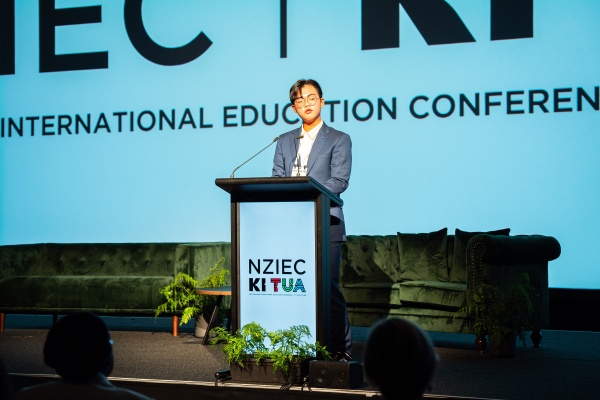
Albert Lu spoke about the differences in school life in his native Taiwan and New Zealand and what he likes about studying in Wellington.
Albert Lu (Taiwan), a Year 11 student at Wellington High School, noted the differences in life in Taiwan and New Zealand as he spoke about his experience in New Zealand.
Albert spoke about the NCEA curriculum providing an opportunity to students to enjoy a good balanced lifestyle, how confidence was the key to settling into life in New Zealand and importantly, ‘another way to improve language faster is to hang out with friends whose first language is not my first language’. Albert does this through joining student groups, attending church and generally being proactive about life here in New Zealand.
“Everyone is friendly, I love it,” Albert said.
*Wero: In this context, a wero is a traditional Māori challenge, performed by Māori warriors at a pōwhiri to test the intentions of visitors – by wielding weapons and laying down the challenge, with a token, such as a small branch for visitors to pick up and show they come in peace. Wero can also be used to convey a 'challenge' in other settings besides the traditional usage.
-
Find out more about what international students think about their NZ experience
Director of Insights for Education New Zealand Manapou ki te Ao (ENZ), Marie Clark, and Student Experience Manager, Ross Crosson will be hosting a webinar on 22 August 2024 from 7-8pm NZST on the recently released 2024 Student Experience Survey results. The webinar is for anyone in our sector who is interested in delving more into the data.
Marie and Ross will talk about the overall student experience for international students enrolled with a New Zealand education provider and where improvements can be made to enhance the international student experience.
You can register via the following link: https://enz.zoom.us/s/81600505051
If you can't make the live session, a recording will be available on Intellilab from Friday.
ENZ’s media release which includes links to the report and data sets can be found on our website - Rise in international students rating New Zealand experience positively » Education NZ (enz.govt.nz) .
- International photo round-up
-
Special offer on ICEF Academy NZ Education Agent Course
ICEF Academy, the professional training arm of ICEF, has launched a new online course that is designed to equip education agents with the resources they need to provide the highest quality of guidance to students wishing to study in Aotearoa New Zealand.
The New Zealand Education Agent Course (NZEAC) has been developed in collaboration with Education New Zealand Manapou ki te Ao (ENZ) and adds to the ICEF Academy’s portfolio of destination training.
ICEF is now offering a promotional rate for readers of E-News. Education agents can use the code NZEAC30 during checkout to purchase the exam with a 30% discount. This offer is available until 31 December 2024.
Since its 27 June launch date, the course is already proving popular. As of 14 August, 618 education agents have enrolled in the course, 532 have started, 127 have completed the course, and 16 have graduated.
Commenting on the course’s uptake, Sahinde Pala, General Manager Sector Services at ENZ said it was encouraging to see that the course was proving popular amongst education agents.
About the course itself, she said “The course offers comprehensive insights for education agents to help them advise students on study in Aotearoa New Zealand. It will help them become better informed about the country’s policies, culture and education system so that their advice to students is current, accurate and helpful.”
In undertaking this course, education agents will have the opportunity to study modules which will encompass New Zealand’s culture and history, education system, work policies and legislation, as well as effective student recruitment and support. The course is self-paced and free, however those seeking to highlight their knowledge as a destination New Zealand specialist have the option to undertake a paid certification exam, for which the 30% discount applies.
Education Agents interested in learning more about the New Zealand Education Agent Course can learn more at: New Zealand Education Agent Course (NZEAC) | ICEF Academy. Education agents are also reminded to register with AgentLab to keep up-to-date with all agent-related news and information.
-
ENZ reflections on NZIEC KI TUA 2024
ENZ’s Acting Director International, Ben Burrowes summed his experience up succinctly and said....

“As always, I found the conference to be an awesome opportunity to connect face-to-face with my colleagues and friends across the sector. It was hugely helpful to discuss (in-person) their areas of focus and how we can continue to align ENZ’s International team’s work alongside them”.
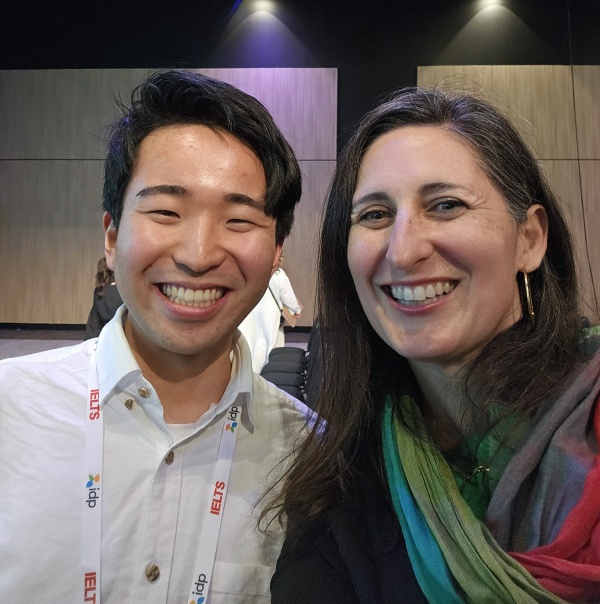
General Manager Sector Services Sahinde Pala with international student Ibuki Nishida.
General Manager Sector Services, Sahinde Pala, said....
“It was wonderful to see so many colleagues from across the global international education sector connecting with each other over the 2 ½ days of NZIEC KI TUA. Attendees and speakers brought a global approach to thoughts and reflections and was a reminder of the environment within which we’re working. The extended networking breaks saw much cross-sector collaboration and sharing of good practice.
“The attendance and speech by the President of India, Smt. Droupadi Murmu, was a great honour – the President reflected on the importance of international education for communities as well as the individual, how transformative education has been for her during her life, and the value of Indian international students in NZ,” said Sahinde.
“Dr Fanta Aw was a crowd favourite, with her reflections on the complimentary nature of international education alongside domestic education and the opportunity for us to collaborate globally given the societal value it brings to our communities and countries.
“My absolute highlight is always the student speakers, who threw down the wero (challenge) to delegates to keep focused on the importance of striving to deliver an excellent student experience,” Sahinde added.
I’m really proud of the whole ENZ whānau who collaborated to put on yet another successful NZIEC KI TUA”.

ENZ’s General Manager Sector Engagement, Innovation and Growth, Wendy Kerr (pictured second from left) said that attending NZIEC was incredibly energising.
“I was impressed by our teams combined approach to developing new areas for high value growth. Adrian Hirst, ENZ’s Director of Marketing, spoke passionately about the challenge of standing out in the competitive international education market. His words resonated with me: “In a sea of competing destinations, it’s increasingly difficult to stand out.” It really made me think about the importance of creating a unique identity that speaks to prospective students and their families," said Wendy.
"Christina Gomes, our Director of Innovation and Growth, shared an exciting framework that aligns global demand with New Zealand’s strengths. I was particularly drawn to her insights on the agri-food sector, which highlighted New Zealand's expertise and global reputation. This provides an anchor to develop our unique identity and secure additional learners by targeting a new segment".
Wendy added, "Tim Brown introduced a new “mixed reality” tool designed to immerse prospective students in the New Zealand agri-food systems career opportunities and study experience".
"I left the conference feeling energised and hopeful about these initiatives, knowing they could accelerate how we attract additional international students and showcase the incredible opportunities that New Zealand offers. It was a reminder of the exciting future ahead for our education sector!" -
Thank you to NZIEC KI TUA 2024 Partners
This year’s conference was attended by 449 delegates and saw 31 sessions delivered over two days by 96 speakers, including expert panellists.
It was a pleasure to have India as our Country of Honour and the support of the High Commissioner of India to New Zealand, Her Excellency Ms. Neeta Bhushan and the High Commission of India.
To our NZIEC KI TUA 2024 partners; CANIE: Climate Action Network for International Educators, Edified, Education USA, ETS TOEFL, Flywire, Hiremaster, Host Families NZ, ICEF, IDP Education Ltd and IELTS Official, Immigration New Zealand and NZQA, Pearson, Streamliner Productions, Studentsafe (Allianz Partners New Zealand), The PIE, ByteEd, Chasing Time English, JIX Reality and Pipi Learning, Touchprint, Te Kunenga ki Pūrehuroa Massey University and Te Herenga Waka Victoria University of Wellington - thank you for your support.
ENZ Manager, Global Events and Agents, Janine Huxford says, 'We are so appreciative for the fantastic support from our suppliers and partners who went above and beyond to help us achieve our vision.”
“The conference wouldn't have been possible without you" Janine added.


The High Commission of India provided the entertainment for the gala dinner, with the Natraj Dance Company and Shivam dance company dance groups delivering dazzling performances to delegates.

To highlight the country of honour’s unique culture, henna artist Saburi Kesharwani adorned delegates with henna tattoos in the Experience Garden.
There were many other engaging activations in our Experience Garden, which was a place delegates could do just that – engage, connect, and experience.


Education USA helped attendees uncover their inner superhero. Teacher Tapahia Heke is New Zealand’s only ‘superhero reader’ and was at the conference to help delegates find their superhero alter-ego – right down to the outfit. Graphic designer and animation professional Pita Mei brought the readings to life, providing delegates with a personalised superhero illustration to take home.

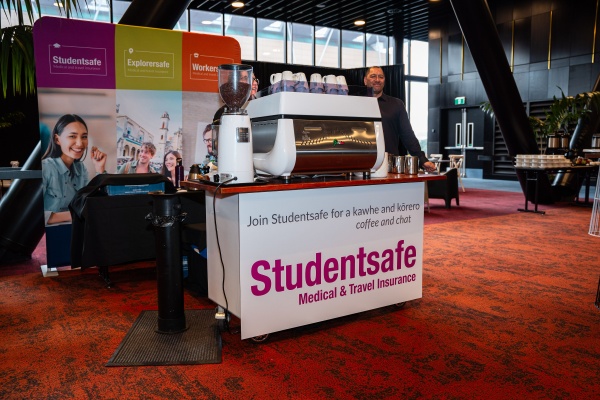
Delicious refreshments were key in the experience garden. Delegates enjoyed locally made ICEF-cream provided by ICEF and barista-made coffee from Student Safe.

Thanks to IDP Education Ltd there was a dedicated breakout space for conference attendees. The IDP IELTS lounge was a space to network, learn about the latest international education insights and catch up on their emails.

Thanks to Touchprint, who created the ‘Touchprint School Yard’, a space for the school sector delegates to connect and share.

The Pearson photography headshots activation was a hit, with just under 100 photos taken by local professional photographer Rebecca McMillan.
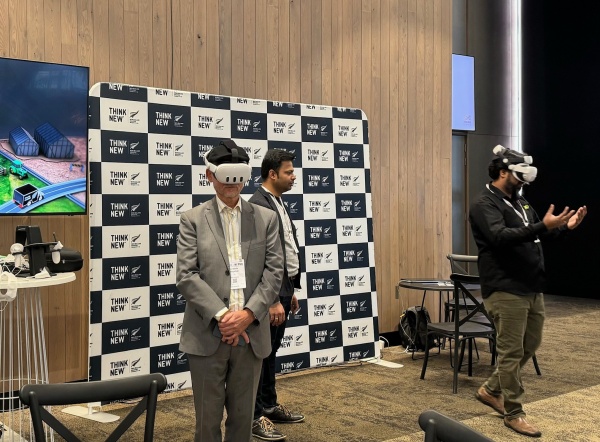
Delegates got the opportunity to try out some of the cutting-edge technology that some of our New Zealand EdTech companies offer. Pictured here is Dr Anatole Bogatski, Executive Director of QTI trying out the mixed reality prototype that ENZ is testing as part of its innovation and growth programme. Next to him is JIX Founder Sakthi Ranganathan trying out the tool that he has helped develop. Other New Zealand EdTechs also found in the Experience Garden included Pipi Learning, ByteEd and Chasing Time English.

Much appreciation goes to our partner Flywire as the Education New Zealand Manapou ki te Ao Tāmaki Makaurau Auckland office now has a new piece of artwork based on insights from attendees for their office wall.
NZIEC KI TUA 2024 was not just about nurturing the relationships within our sector. Thanks to our conference partner Edified, it was about nurturing our whenua (land) too! In our commitment to sustainability; for every delegate registration, Edified planted a native tree, fostering a greener future for generations to come.
449 native trees were planted over the weekend after conference.
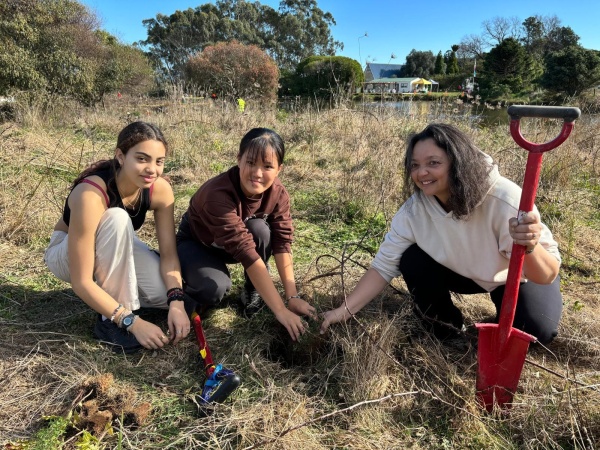
We’re grateful for the local hāpu, iwi and community who got stuck in and helped with the planting. Part of the team was international student Momone Akiyoshi, who’s from Japan and is currently studying at Paraparaumu College. Her host sister Marion Daste (left) and host mum Jo Picot (right) brought her along because they thought it would be nice for Momone to be part of regenerating the land and having the opportunity of planting native trees while in New Zealand.
Thanks to all our 2024 partners in making this year’s conference a great one!
-
NZIEC KI TUA 2024 photo feature
You can also check out a highlights reel of delegate's contributions to the conference blackboard below. See if you can spot yourself!


